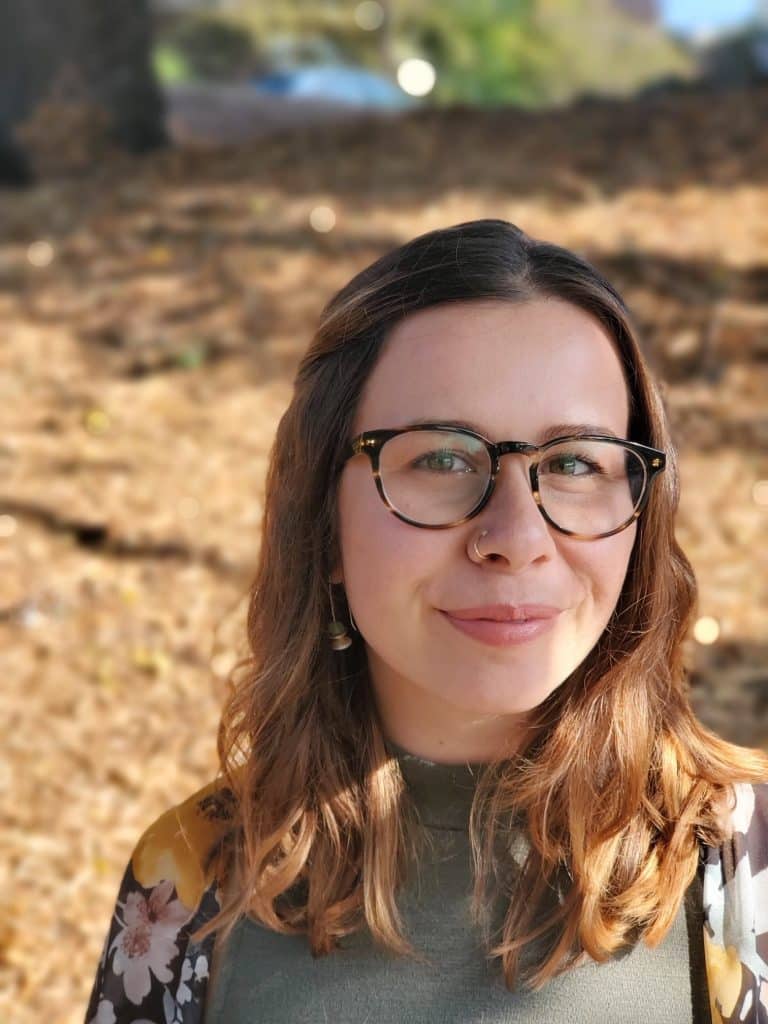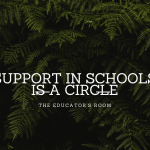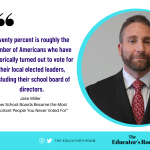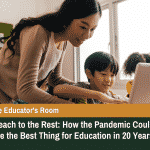In order to change destructive patterns, we need to stop pretending they aren’t there.
Have you signed up for The Educator’s Room Daily Newsletter? Click here and support independent journalism!
For what feels like the thousandth time, I am laying in bed at 4:00 p.m. Exhausted from the teacher workday and too drained to be productive, I am scrolling through social media yet again. And for what feels like the thousandth time, I run into that particular brand of teacher content that I like to call the Toxic Positivity Propaganda Machine.
You know what it is.
It’s the fashionable, always-upbeat educator telling us that being on her sixth cup of coffee is worth it because she loves her job. It’s the teacher talking about how they haven’t seen their friends in two months because they’ve been so busy planning, but they wouldn’t have it any other way. Smile. Hashtag. Teacher Life.
Educators, are we okay with this? Let me rephrase. When did we become okay with this, and how can we stop? Because the truth is, it hurts us far more than it helps.
What is Toxic Positivity in the Teaching World?
Toxic positivity, in general, is the idea that we should respond to negative circumstances by projecting an attitude of unreasonable optimism. It’s telling a friend with depression to think happier thoughts and take deeper breaths. If we all just act happier, the darkness will go away.
In the teaching world, toxic positivity isn’t just “TeacherGram” and “TeacherTok”. It has seeped into our professional developments, staff meetings, and collegial interactions for years. The narrative is insidious: it doesn’t matter that we’re overworked and underpaid, or that the education field is dominated by white supremacy and corporate interests. It doesn’t matter that our mental health is at an all time low. We should smile, put our heads down, have a free cookie, and get back to business as usual.
Don’t like to suffer? Perhaps this isn’t the job for you. Teacher burnout, after all, is glamorous.
A Wake Up Call
Since the beginning of the COVID-19 pandemic, we have lost almost 1,300 teachers and school workers to the disease. With our school models constantly shifting over the last two years, we’ve had no time to mourn this unfathomable loss. Moreover, we’ve spent the last two years trying to get the world to understand that we are valuable and deserve to be safe. All the while, our expertise is under attack from those who would like to deny history, and an epidemic of gun violence continues to plague our schools.
The extreme stress of teaching in 2022 is eroding our profession. Teachers experience far higher rates of depression than those in other jobs. As of February 2022, an NEA survey revealed that 55% of teachers are now planning to walk away from the job earlier than they originally planned to.
We can’t Pinterest board our way out of this.
The Big Lie
Of course, toxic positivity is not the ultimate root of our current problems. But it definitely isn’t helping. In fact, I believe that it is actively aiding in our downfall.
The most destructive thing about the Toxic Positivity Propaganda Machine is that it sells us one of the most pervasive lies in the education world: We should be totally fine with feeling this way, because it means we’re great teachers. We’re not burned out, we’re just “teacher tired”, and “teacher tired” is relatable and fun.
Positive Message, Negative Impact
Romanticizing the teacher grind may help districts, but it hurts teachers and students alike. What happens to a new teacher who feels crushed by the job while everyone around them seems to be soaring? They start to feel like everyone else is tougher than they are. They start to feel like the fault is all theirs. Maybe they’re not cut out for this; maybe they should leave.
The reality? New teachers are often unsupported, overburdened, and underpaid. They’re building an airplane that is already in the air. It is an impossible job to do alone, and the problem is structural, not individual. As long as we keep hiding this reality under songs and dances, we can’t push for the changes we need. We’ll keep losing new teachers because of it.
And what about our students? They’re more observant than we give them credit for, and their eyes are fixed on us. We preach the need to nurture “the whole child”, but are we qualified to do so if we aren’t nurturing our whole selves? What kind of message are we sending when students see us treating ourselves like cheerful machines?
It’s Time to Flip the Script
We are at a pivotal point in the profession. With massive teacher shortages looming, we are in a prime position to advocate loudly for what we need: more pay, more protection, more autonomy, more equity, more hands — whatever it may be. It isn’t sustainable to waste away for our students. It isn’t sustainable to put work over living. Moreover, it’s a dangerous mentality to keep passing down to our students, especially during a time of global crisis. After all, if this is how we’re feeling, how are they feeling? If this is what we need, what do they need?
It’s not negative to reject toxic positivity. It is hopeful and compassionate to be real with one another instead. When we share our struggles, our community strengthens. We have the ability to discuss solutions, policy changes, and ideas for a better world. When we trick ourselves into normalizing burnout, we deprive ourselves of the ability to create a more equitable sustainable future. We suffer the consequences and give them as hand-me-downs to the next generation.
These days, in the teaching profession, you either die the hero or live long enough to see yourself become the villain. It doesn’t have to be this way. But in order to change the pattern, we need to stop pretending it isn’t there. We can’t keep our heads buried in the sand even if the sand is bubbly and color-coordinated. The ultimate act of optimism is being vocal and honest about what we need.

Cleo Rohn (she/her) is a poet, spoken word performer, and educator with her roots in rural Vermont and her branches in Seattle. Her creative work often dwells on the link between place and self, and on the basic essences that connect us to one another. Outside of poetry, she writes about education, mental health, creativity, and the strangeness of being human.
Her poetic work has been published in Allegory Ridge, After Happy Hour Review, The Wild Word, The Song Between Our Stars, The Water Tower, Vantage Point, and Dryland Lit. Further poems are forthcoming in Brave Voices Magazine and Kind Writers. You can subscribe to her Medium work here.
Editor’s Note: If you enjoyed this article, please become a Patreon supporter by clicking here.







Thank you for this. You know the issue deeply and articulate it so well. You give us voice!